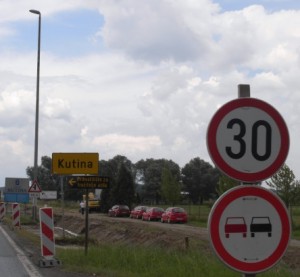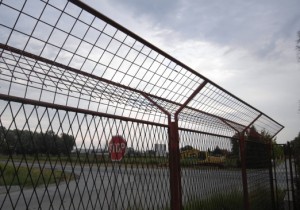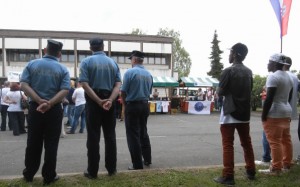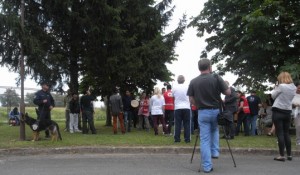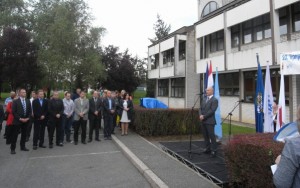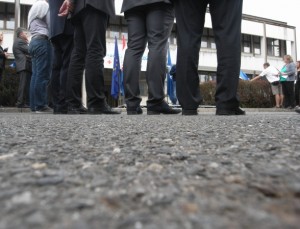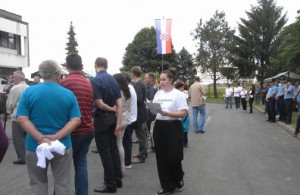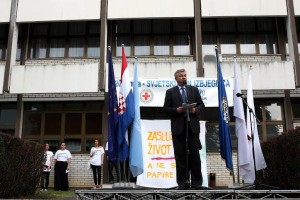Kutina: the Opening of a New Reception Center and World Refugee Day
On the 18th of June 2014, a commemoration of the World Refugee Day and the opening of a new reception center for asylum seekers took place in Kutina. The event was organised by the Ministry of the Interior, UNHCR and the Croatian Red Cross. The official speakers spoke of the efforts the authorities are undertaking to protect vulnerable asylum seekers in Croatia. A group of citizen staged a symbolic protest, pointing out the other side of the story: the exclusionary nature of the migration policies in Croatia and the EU.
Reception center renovated
Kutina, located about 60 km south-east of Zagreb, is a town of less than 15000 inhabitants. Croatia developed its independent asylum system in 2004 and for the first two years, asylum seekers were accommodated at a temporary location in Šašna Greda. In 2006, Kutina became the location for the “permanent” reception center for asylum seekers and it remained the only such center, until a few years ago, when the numbers of asylum claims in Croatia started to rise. With the increased use of the Balkans migratory route and with the tighter border controls, the numbers of people seeking asylum in Croatia rose from 290 in 2010, to 1193 in 2012[1]. Due to the lack of space, temporary accommodation was provided in facilities not specifically constructed for the purpose of housing asylum seekers: in « hotel Porin » and in Valbaldon.[2] Despite these new facilities, the reception center in Kutina kept on being overcrowded throughout 2011, 2012 and 2013. In 2013, the situation started to escalate, both with the near break-down of the center due to maintenance problems and with the xenophobic impulses being bolstered in the local population.
In the summer of 2013, the center in Kutina was closed down for renovation and was being re-adapted into a center for “vulnerable” groups of asylum seekers: families, women, unaccompanied minors. In the meantime, all asylum seekers were housed in Porin, which became the other “permanent” reception center for asylum seekers.
For now, the center in Kutina is not yet in use. There are still things to be added to the construction – such as the children’s playground, financed by the UNHCR. The high fences encircling the whole building, however, are already in place.
Commemoration of the World Refugee Day and police dogs
The opening of the reception center was at the same time an early commemoration of the World Refugee Day, which is celebrated world-wide on the 20th of June. The event took place at the courtyard of the new center. It was organised by the Ministry of the Interior (in cooperation with the Red Cross and UNHCR) and the parking lot of the center was dotted by police cars, police officers in uniforms and even a police unit equipped with a search dog. The asylum seekers who attended were brought by a bus from their accommodation in Porin and though a bus trip was a welcome change to their daily routine, the atmosphere was far from joyous or celebratory.
The program of the day seemed to have two parts. The first included asylum seekers: there was a football tournament, an array of sporting (volleyball, table tennis, badminton) and cultural activities (drum playing), as well as a production of a large canvas with paintings, messages and expressions of the people present. The second part excluded them: it consisted of the inauguration speeches of the Minister of the Interior, the representative of the UNHCR and other officials who spoke about the new center and the situation of asylum seekers and refugees in Croatia. The speeches were followed by an extensive mainstream media coverage. By the attention that this second part of the program received, it was clear that the whole event was intended for showing a facade of care for refugees and human rights, hiding a much less humane reality.
This was especially apparent during the inauguration speeches. The speakers stood at the entrance to the center, they were surrounded first by a line of journalists and then by a line of employees of the Ministry of the Interior, the Red Cross and UNHCR. At the very edges and far away from the stage, asylum seekers were standing. It was clear that the speeches were not addressed to them. To start with, the speeches were all in Croatian (with the exception of the head of the UNHCR in Croatia, who spoke in English and had his speech translated into Croatian). Even though some of the asylum seekers have been in Croatia for well over a year, it is very difficult for them to learn Croatian, because they are pushed to the margins of society and there is no systematic provision for Croatian language courses during the procedure of seeking asylum – or for that matter after a person has gotten a positive answer to their asylum claim. Mostly they did not understand a word of what was said and no translation was provided. But more importantly, what was said by the speakers reflected little of the everyday reality of asylum seekers. None of them spoke about the months and years of waiting for an answer to the asylum claim, of the inability to work, go to school, learn a language, become part of the society. None of them spoke about what happens to those who get a negative response to their asylum claim, and how it feels like to be imprisoned for the sole reason of not having the right documents. “The refugees”, even on the occasion of the “World Refugee Day” were given no space at all to say what their lived experience of being an asylum seeker in Croatia is. None of the journalists talked with migrants present and the only space left for them to express their feelings was a blank canvas and some paints.
“Life, as well as papers”
During the inauguration ceremony, a group of citizens took the space to express a critical voice with their peaceful protest. While the minister of the interior was speaking about the efforts to protect the vulnerable asylum seekers, about 10 people put on a white T-shirt with a sign saying “I deserve a life, as well as papers”[3] and distributed T-shirts and information leaflets to the audience. A few of the protesters also unfolded a banner with the same message and took the space behind the minister, in full view of the cameras and journalists.
The protesters’ message was meant as a criticism of the system which links entitlement to rights to having the right papers/documents and makes it difficult for some groups of people to obtain these papers. Besides, they wanted to highlight the fact that, in Croatia, even “a paper” (for example a refugee status) does not entail a dignified life. They criticized in their leaflet the restrictive EU migration policies, which are obediently reproduced in Croatia, and result in illegalisation, dehumanisation and marginalisation of migrants. They called for a movement of solidarity with migrants and for a collective struggle for a better and more just position of migrants.
[1] Source: http://www.unhcr.hr/2012-12-20-09-46-40/statistics.
[2] One was in Valbaldon, close to the cost-town of Pula in Istria, which only operated in the winter months. The other one was in the abandoned hotel Porin at the outskirts of Zagreb in the suburbs of Dugave.
[3] Or « Zaslužujem život, ne samo papire. » in Croatian.

